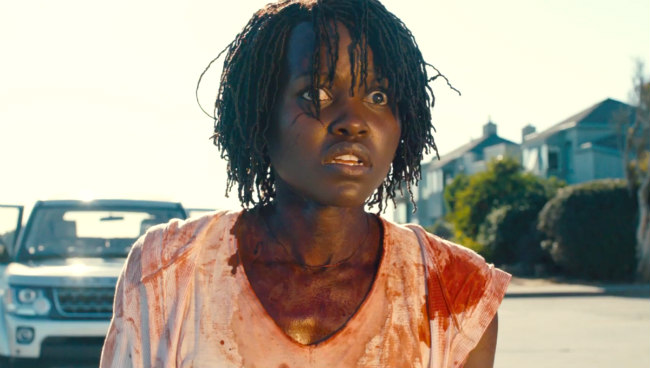
The pressure to repeat yourself as a director, especially when your debut feature is as successful as Get Out was, must be intense. In his follow up, Us, Jordan Peele’s ability to maintain style without repeating content, to give us what we want without giving us what we’re expecting, is about as close as it gets to a blueprint for modern commercially viable filmmaking. With the future of the theatrical experience itself in doubt, we’re told the only thing that still gets people into the theater anymore are “brands” — Marvel, Star Wars, Pixar. After Us, “Jordan Peele” feels like a brand of its own.
It’s not easy to have a $70 million opening weekend for a non-animated movie not based on an existing IP (“intellectual property” — ie, not a sequel, not based on a comic book, TV show, breakfast cereal, etc). In fact, BoxOfficeMojo is calling Us‘ first weekend “the second largest opening ever for a live-action, original movie” (not based on existing IP). The scale of that success comes into focus when you scroll up to the first largest such opening, Avatar, at $77 million, which cost $237 million to make. Us cost $20 million.
Box office numbers are an imperfect way to explain a movie’s impact and importance, but clearly something is happening here, and it goes a lot further than Us coasting on the love for Get Out. The movies aren’t even that similar, aside from both being ostensible horror movies co-produced by Jason Blum (who certainly deserves some credit for all this success).
Get Out embraced the horror movie format for a quasi-comedic racial satire. Peele essentially used the promise of genre to deliver social satire. In Us, you go in expecting sort of the same thing, but it mostly ends up just being a slick horror movie. Not especially introspective, but just think-y enough. In Us, Peele uses the promise of social satire to deliver genre.
Lupita Nyong’o plays Adelaide Wilson, who we first meet in 1986 when she’s a little girl visiting the Santa Cruz Beach Boardwalk for the first time. As a person who also visited the Santa Cruz Beach Boardwalk in the ’80s and ’90s I can confirm that it is a perfect setting in which to imagine evil spirits, vampires, and the like (see also: Lost Boys), a theme park that somehow feels pre-abandoned, full of ghosts even when it’s at full capacity with the living. How many cults and serial killers have passed through this area?
Adelaide wanders away from her inebriated father into a hall of mirrors, only to discover that classic horror movie trope — the “reflection” moving of its own accord. 30 years later, Adelaide is on a vacation with her husband, Gabe (Winston Duke, previously M’Baku in Black Panther) and two kids, returning to Santa Cruz once again, where she can’t shake the feeling that her double is still out there somewhere.
You keep expecting this premise, a horror movie based on the idea of doppelgangers, to reveal itself as a contemporary observation on race relations, a la Get Out. Only it never does. There are certainly contrasts drawn between Gabe and Ade and their white counterparts — Gabe’s friend Josh (Tim Heidecker), and his wife (Elizabeth Moss) and family — but they’re not meant to represent interactions between black families and white families the world over. It’s just about these two families. It’s universal because it’s specific, which is of course a kind of comment of its own.
Get Out was relatable with its clear subtext, whereas Us subverts expectations, hinting at a meaning much more inscrutable with clues scattered throughout. There’s the homeless man holding a sign that says “Jeremiah 11:11,” and the repeated references to 11:11, and the backdrop of Hands Across America. In the absence of overt social commentary, Us leaves us with… just a really solid genre film, perfectly cast and acted, frequently flirting with schlock, with mysterious symbology and a Shyamalan-ready third act twist that I totally should’ve seen coming but somehow didn’t.
Would Us have worked as well if it didn’t have Get Out‘s expectations to subvert? Probably not, but the goal of genre film and especially horror is to trick and to confound, to get us to buy in temporarily to something we know on the face of it is “just a movie.” Peele would be a fool not to utilize the tools available for his sleight of hand.
Peele doesn’t repeat content, he repeats style, and, God-willing, he’s created a template for the viability of theater-going in the era of streaming. Because let’s be honest, “existing IP” is going to get pretty dull without creating any new IP (as if it hasn’t already).
In using his powers as the progenitor of a phenomenon to justify genre, it’s almost as if Jordan Peele is making a case for entertainment as art, proving that the genre film can be meaningful even when it doesn’t have its social context displayed in blinking lights. Movies need that now more than ever.
If Us is the beginning of a new auteur era, where actual adults pay real money to go see movies because of a buzzy creator and not because of big brands or existing IP, it can’t come fast enough.
Vince Mancini is on Twitter. You can access his archive of reviews here.






